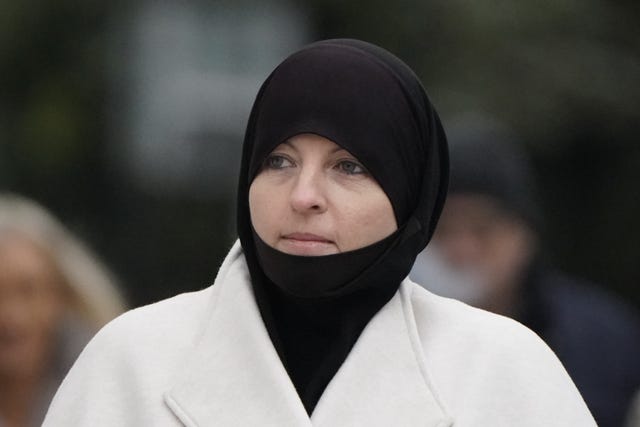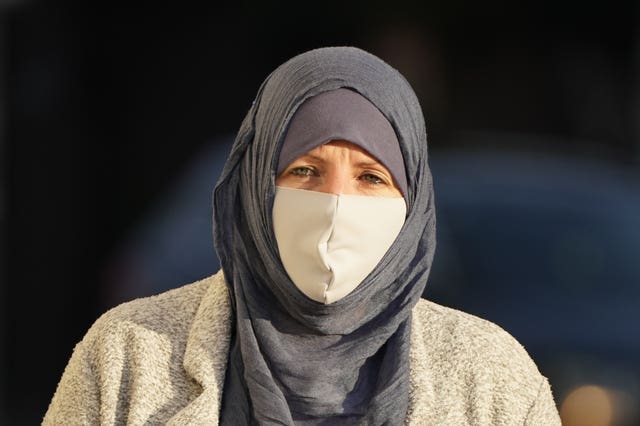Lisa Smith ‘enveloped herself in the black flag of Islamic State’, court hears
The 39-year-old, from Co Louth, has pleaded not guilty to charges of being a member of the terror group and financing terrorism.

Former Defence Forces soldier Lisa Smith “enveloped herself in the black flag” of the so-called Islamic State, the Special Criminal Court has heard.
The Co Louth woman, 39, pleaded not guilty on Tuesday to charges of membership of the illegal organisation and of providing funds to benefit the group.
Sean Gillane SC, for the prosecution, told the court that the accused’s conduct during the period between 2015 and 2019 when she travelled to Syria could “prove membership” of the terror organisation.
In his opening remarks, Mr Gillane said the court would hear that Smith spoke about her “joy” at being in Syria, that she had “wanted jihad”, that she had a desire to live under Sharia law and had a “willingness to die as a martyr”.
“Hijrah in this context is a central act of allegiance to this proto-State, without which the organisation cannot survive. It is the very lifeblood of the Islamic State,” Mr Gillane told the court.
“IS needed fighters but also those who could give sustenance and vitality to the group.”
He said that participation in that act of hijrah was to “self-identify as a member” of the organisation.
Mr Gillane added: “There is no duality or split between a good Islamic State and a bad one, into which one might fall through happenstance or misfortune.”
He said the evidence would show that Smith willingly remained in Syria, married there and that her movements mirrored that of the terror group when they lost territories in the region.
The prosecutor said there was a “reciprocity” to Ms Smith’s allegiance to IS, in that she had received “protection” while in the region.
“Ms Smith specifically addressed, assessed and answered the call to migrate to territory controlled by IS,” Mr Gillane said.
“Every inch of that territory was won by a targeted campaign of violence.”

He said the members discussed why they had been drowned, with Smith responding: “OK, I understand why they were drowned. I didn’t know half of the story.”
The court heard that the accused had begun her trip to Syria October 2015, and that she had lied to family members about her destination.
Smith bought a one-way ticket from Dublin to Istanbul, which was paid for in cash, the court heard.
From there, she crossed the border into Syria and IS-controlled territory.
When she arrived, she was instructed to change the security settings on her phone, and to join another group on the private messaging service Telegram, the court was told.
Around this time, Smith “made clear to her family her desire to stay”, the court heard.
On Tuesday the court heard from the first witness, Una McCartney, from Dundalk, a friend of Smith’s for between 15 and 20 years.
She told the court that she and Smith had had plenty of discussions about religion around the time of her conversion to Islam around 2007.
Ms McCartney described them as “normal discussions” regarding different beliefs in Catholicism and Islam.
She said Smith had discussed moving to a Muslim country because she wanted to be “surrounded by people who were the same faith as her”, but said she did not recall Smith stating any intention to travel to Syria.
Under cross-examination by Michael O’Higgins SC for the defence, Ms McCartney said Smith has a troubled background.
“We all enjoyed drinking, partying, myself included. We were probably a bit wild.”
Ms McCartney added: “Drink didn’t really suit her.”
The witness told the court that she believed Smith’s interest in Islam would “fizzle out” over time.
“She would go hell for leather with things in the beginning and then it would fizzle out. I thought this would fizzle out as well.”

“My impression was she needed help or counselling. She had burned bridges with some of her friends,” the witness said.
Ms McCartney said the accused may have turned to Islam to find some solace.
She recalled her Garda interview in which she described Smith as “very naive and easily taken in by somebody promising her something”.
The court later heard from Jillian McNicoll, a Muslim woman originally from Edinburgh who has lived in Ireland since 1998, who said she teaches the faith to women who are new to the religion.
Ms McNicoll said she had met the accused only once, during which time Ms Smith told her about a dream she had had about the prophet Mohammed.
She said this struck her as unusual, as it would normally only happen to Muslims who are “exceptionally pious” and was not a “regular thing”.
Ms McNicoll added that she felt there was “something attention-seeking” about it.
The case received widespread attention in 2019 when it emerged that Smith, a former Air Corps soldier who had worked on the Government jet, had been detained in Syria over alleged links to IS.
Smith was arrested at Dublin Airport in 2019 on suspicion of terrorist offences after returning from Turkey in November with her young daughter.
She had travelled to Syria a number of years ago after she converted to Islam.
Smith is charged under Section Six of the Criminal Justice (Terrorist Offences) Act 2005 which makes it an offence to join a foreign unlawful organisation.
It is alleged that between October 28 2015 and December 1 2019 at a location outside the State, she was a member of a terrorist group styling itself as the Islamic State.
She has also been accused of financing terrorism by sending 800 euro in assistance by Western Union money transfer to a named individual in 2015.
Smith has denied the charges.
The case will resume at 10.30am on Wednesday at the Special Criminal Court.





